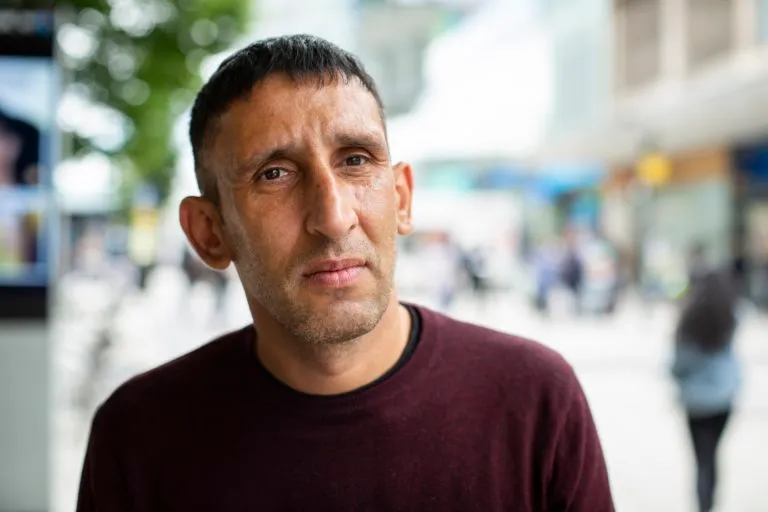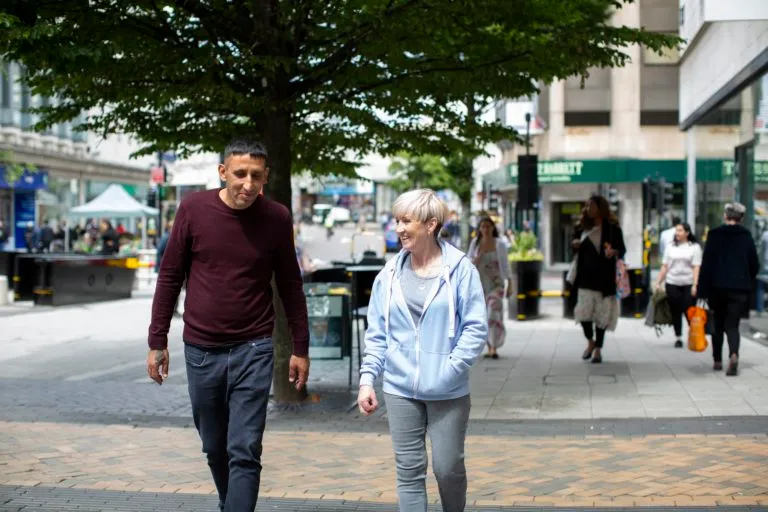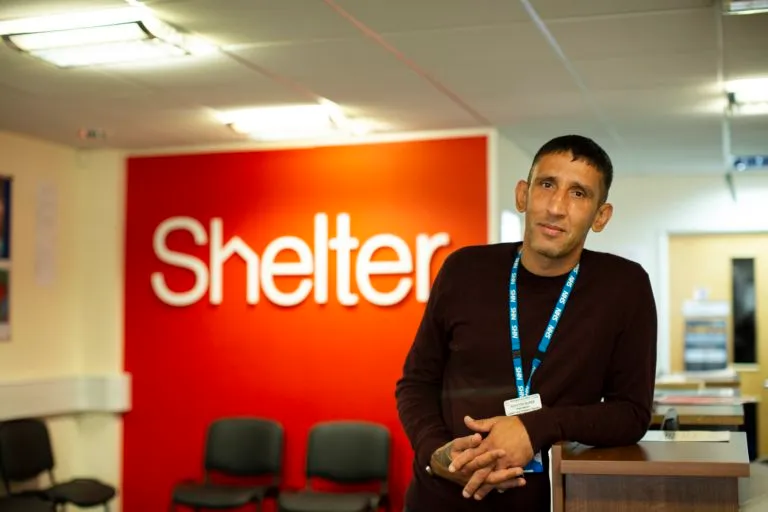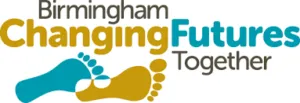‘I was stuck and I wasn’t proud of what I’d become’.
Published: by Guest blog

My name is Paddy and I am 44 years old.
Growing up, I remember being locked in a dark bathroom with boarded windows. I was about three years old and living in London with my alcoholic mum, two younger twin brothers and a stepdad. He used to put me in there if I cried or played up. I remember my nan coming, lots of arguing and raised voices, then her bringing me back to Birmingham.
My nan and grandad had 16 children, but most of them had left home by the time I arrived. I was loved but also frowned upon by some of my older uncles for being a different colour. My nan and grandad spoilt me with love, so I wasn’t really bothered about my uncles’ teasing. Eventually, I grew to love them like brothers. My aunties doted on me and my older cousins loved me. I went to a local Catholic school and I thought life was good. One day, I remember my grandad being taken ill. He had a stroke and never recognised me again after that. I used to go with my nan to visit him in hospital, but when got there I’d wait in the car, as it was too painful to see him like that. He eventually passed away, and I was so relieved he wasn’t in pain anymore.
I started senior school. I was a different colour to most of the other kids and some of them tried to mock me. I was used to this form of emotional bullying from my uncles, but it was different at school. I hated it, and started to truant school rather than fighting. I ended up hanging around with local gangs and committing crime to fit in. If you can’t beat ’em, join ’em, I thought. I started taking recreational drugs and drinking alcohol. Even though I was behaving like this, I still used to help my nan. I would do her shopping and pay her bills at the Post Office. I loved my nan.
‘One day, I’d had enough’
I started a job at the age of 16, but I continued to drink and smoke cannabis. The job only lasted 18 months because of my increased use of alcohol. At 18, I was addicted to alcohol, and at 21, heroin. I was using heroin with my three half-brothers – this was how we became connected. We started to commit petty crime together to fund our addictions. I served several small sentences and became a regular face to the police and the Criminal Justice System. This way of life went on for about 10 years until one day I’d had enough.
I called my old employer and he agreed to give me a job. I was still living with my nan, and to get to work I had to get three buses every day for the next 10 years. I was a functioning addict, taking 130ml of methadone a day. My employer knew of my issues, but as it never affected my work, he overlooked them. Every day I went to work, stopped on the way home to get my fix and drink, then spent the evening with my nan helping around the house. This all came to an end when I accidentally broke my ankle. I couldn’t work so I lost my job, and then my nan passed away – all in a matter of months. I was heartbroken, devastated and angry.
Hitting rock bottom
I was homeless, unemployed, a heroin addict and an alcoholic. My mental health was at rock bottom. I didn’t know which way to turn. I remember being in the doctor’s surgery and headbutting the walls in frustration. I was angry with the council as they had made me homeless after my nan died, and the Job Centre because it was mandatory to attend to get my Giro, but I was unfit for work. None of them were sympathetic to my needs. I felt as though they thought I was just another homeless, jobless junkie – which I was, but I was stuck and I wasn’t proud of what I’d become.
I ended up living in over 60 hostels and shared houses around the city, dealing with unscrupulous landlords and never being able to fit in. I was so unhappy. I wanted more out of life but I was physically and emotionally unable to change. I ended up rough sleeping several times, as I refused to stay in some of the disgusting and dirty hovels I was offered.
The day I met Colette
I remember one day, I was sat on the steps of the Catholic Church in the city, a lady approached me. Her name was Colette. She was really nice and chatty, and genuinely seemed to care about my circumstances. But at first, I thought she was just another ‘do-gooder’. She came and talked to me every evening when she left work. She told me she was a Peer Mentor for Shelter. I was very suspicious of her at first. I thought, ‘why does she stop and chat with me?’. She told me that she had lived the same chaotic life as me and came out the other side. I listened to her story and the journey she’d been on, and I was amazed. The way she spoke to me, she made me believe I could change too. It was what I had dreamt of for years.

She started to support me. I had someone new to kick off with, and when I was having bad days I would head to Shelter and vent my frustrations – normally with Colette. She found me housing several times and even met my family. She arranged to get me into rehab, but I had nowhere safe to stay while I was waiting. Colette visited my aunt and explained the changes I was making to my life. My aunt agreed to let me stay with her until a bed became available at the rehab.
I eventually got to rehab and Colette continued supporting me. She introduced me to mutual aid – a requisite to my continued sobriety. After rehab, she found me a safe place to live and continued supporting me. But I didn’t listen. I thought ‘well I’m clean, I don’t need mutual aid’, so I became isolated at home. Then the boredom set in, and I started smoking mamba. I stopped seeing Colette, as I was embarrassed and felt like a let-down. I was back to my old ways very quickly – I couldn’t believe how rapid the decline was. I was constantly using and isolating every day for eight months, even worse than I had been before. I was so ashamed that I’d thrown it all away.
‘Something clicked in me’
I’d had a taste of recovery and I wanted it back. I remembered all the things that Colette had taught me. I started going to Narcotics Anonymous meetings again, and moved into a ‘dry house’. I was abstinent from all drugs and alcohol, but I was scared that I would start using again, so I stayed in the dry house for 19 months. Staying with others who were like me trying to make a new way in the world and the emotional support I was receiving filled the emptiness.
I started to see Colette again. She introduced me to voluntary work at Shelter, which made me feel part of something. Eventually one of the Team Leaders encouraged me to apply for a Peer Mentor (PM) job. I was scared as it was a huge step. I was giving up the security of benefits, I would have to move from the dry house because I couldn’t afford the rent, and the fears of ‘can I do a good job as a peer mentor?’ plagued me. Colette encouraged me and told me that she had always seen potential in me.

‘Now, life couldn’t be better’
Like when my nan died, in the space of weeks, I had applied for the PM role, the council offered me a flat and I got the job. I was overwhelmed, but I knew things were good. I started working from the same office as Colette. I loved my job and I was good at it. My girlfriend was pregnant, and we had a baby boy. I applied for another position at Shelter and got that, too. I’m now a Housing First Navigator. My life has changed so much thanks to the Lead Worker/Peer Mentor service. I’m now a productive member of society. Colette has been a major part of my journey, and without her, I wouldn’t have known recovery was possible. My partner and I are now expecting our second child and life couldn’t be better.
For further details about the Lead Worker/Peer Mentor Continuation Strategy, please contact Christine Grover, Team Leader. Email: Christine_Grover@shelter.org.uk; tel: 07795391202.
You might also be interested in Tara’s story – another one of our clients, who we supported as part of our Lead Worker/Peer Mentor programme.

Find out more about Birmingham Changing Futures Together service in partnership with Shelter, Birmingham Mind and Sifa Fireside.